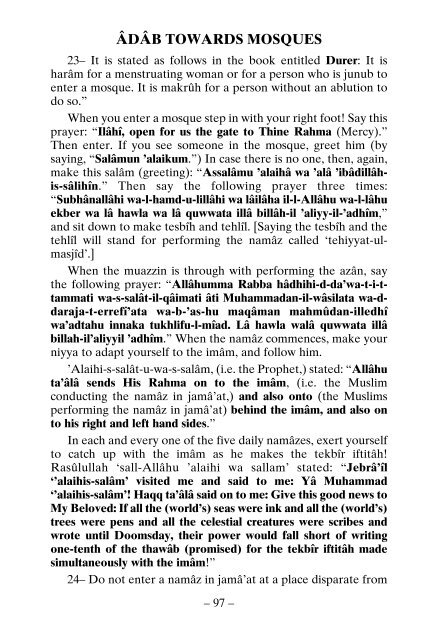O Son !
THE BOOK ‘O SON’ Al-hamdu lillâhi Rabbil ’âlamîn. Wa-s-salâtu wa-s-salâmu ’alâ Rasûlinâ Muhammadin wa Âlihi wa Sahbihi ajma’în. 1– O son! Collecting from books written by the scholars of the Hanafî Madhhab three hundred and sixty hadîth-i-sherîfs and forty-four khabars and also the seven essentials and the five rukns and the seven wâjibs and the fourteen sunnats and the twenty-five mustahabs and the fourteen mufsids of namâz, I have explained them for you. Adapt your acts and deeds to these teachings so that you attain fayz and nejât (salvation)! 2– Also for your information, I have collected a thousand and ninety âdâb (adabs) for you and for other young Muslims like you. If you adapt your actions and acts of worship to these teachings, they will be sufficient for you. If you laze, disobey Allâhu ta’âlâ and cease from these practices and manners, you will be afflicted with slavery and disgrace in the world and subjected to torment in the world to come. If you live up to them and advise your Muslim brothers to do the same, it will be useful for you. They will say blessings over you. And Haqq ta’âlâ will accept their invocations. For, a slave will be pardoned on account of another slave’s invocations for them.
THE BOOK ‘O SON’
Al-hamdu lillâhi Rabbil ’âlamîn. Wa-s-salâtu wa-s-salâmu ’alâ
Rasûlinâ Muhammadin wa Âlihi wa Sahbihi ajma’în.
1– O son! Collecting from books written by the scholars of the
Hanafî Madhhab three hundred and sixty hadîth-i-sherîfs and
forty-four khabars and also the seven essentials and the five rukns
and the seven wâjibs and the fourteen sunnats and the twenty-five
mustahabs and the fourteen mufsids of namâz, I have explained
them for you. Adapt your acts and deeds to these teachings so that
you attain fayz and nejât (salvation)!
2– Also for your information, I have collected a thousand and
ninety âdâb (adabs) for you and for other young Muslims like you.
If you adapt your actions and acts of worship to these teachings,
they will be sufficient for you. If you laze, disobey Allâhu ta’âlâ
and cease from these practices and manners, you will be afflicted
with slavery and disgrace in the world and subjected to torment in
the world to come.
If you live up to them and advise your Muslim brothers to do
the same, it will be useful for you. They will say blessings over you.
And Haqq ta’âlâ will accept their invocations. For, a slave will be
pardoned on account of another slave’s invocations for them.
You also want an ePaper? Increase the reach of your titles
YUMPU automatically turns print PDFs into web optimized ePapers that Google loves.
ÂDÂB TOWARDS MOSQUES<br />
23– It is stated as follows in the book entitled Durer: It is<br />
harâm for a menstruating woman or for a person who is junub to<br />
enter a mosque. It is makrûh for a person without an ablution to<br />
do so.”<br />
When you enter a mosque step in with your right foot! Say this<br />
prayer: “Ilâhî, open for us the gate to Thine Rahma (Mercy).”<br />
Then enter. If you see someone in the mosque, greet him (by<br />
saying, “Salâmun ’alaikum.”) In case there is no one, then, again,<br />
make this salâm (greeting): “Assalâmu ’alaihâ wa ’alâ ’ibâdillâhis-sâlihîn.”<br />
Then say the following prayer three times:<br />
“Subhânallâhi wa-l-hamd-u-lillâhi wa lâilâha il-l-Allâhu wa-l-lâhu<br />
ekber wa lâ hawla wa lâ quwwata illâ billâh-il ’aliyy-il-’adhîm,”<br />
and sit down to make tesbîh and tehlîl. [Saying the tesbîh and the<br />
tehlîl will stand for performing the namâz called ‘tehiyyat-ulmasjîd’.]<br />
When the muazzin is through with performing the azân, say<br />
the following prayer: “Allâhumma Rabba hâdhihi-d-da’wa-t-i-ttammati<br />
wa-s-salât-il-qâimati âti Muhammadan-il-wâsilata wa-ddaraja-t-errefî’ata<br />
wa-b-’as-hu maqâman mahmûdan-illedhî<br />
wa’adtahu innaka tukhlifu-l-mîad. Lâ hawla walâ quwwata illâ<br />
billah-il’aliyyil ’adhîm.” When the namâz commences, make your<br />
niyya to adapt yourself to the imâm, and follow him.<br />
’Alaihi-s-salât-u-wa-s-salâm, (i.e. the Prophet,) stated: “Allâhu<br />
ta’âlâ sends His Rahma on to the imâm, (i.e. the Muslim<br />
conducting the namâz in jamâ’at,) and also onto (the Muslims<br />
performing the namâz in jamâ’at) behind the imâm, and also on<br />
to his right and left hand sides.”<br />
In each and every one of the five daily namâzes, exert yourself<br />
to catch up with the imâm as he makes the tekbîr iftitâh!<br />
Rasûlullah ‘sall-Allâhu ’alaihi wa sallam’ stated: “Jebrâ’îl<br />
‘’alaihis-salâm’ visited me and said to me: Yâ Muhammad<br />
‘’alaihis-salâm’! Haqq ta’âlâ said on to me: Give this good news to<br />
My Beloved: If all the (world’s) seas were ink and all the (world’s)<br />
trees were pens and all the celestial creatures were scribes and<br />
wrote until Doomsday, their power would fall short of writing<br />
one-tenth of the thawâb (promised) for the tekbîr iftitâh made<br />
simultaneously with the imâm!”<br />
24– Do not enter a namâz in jamâ’at at a place disparate from<br />
– 97 –

















